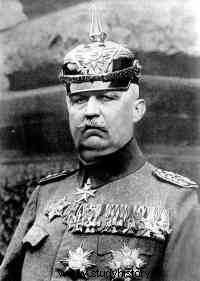Erich Ludendorff, born on April 9, 1865 in Kruszewnia near Posen in Prussia (today Poznań in Poland), died on December 22, 1937 in Tutzing in Bavaria, was general-in-chief of the German armies during the First World War, from 1916 to 1918. He actively supported the Nazi movement in its early days (1920s), before turning away from it, while maintaining far-right views.

Before the war
Ludendorff was "Erich Ludendorff" and not "Erich von Ludendorff"; only her mother, Klara von Tempelhoff, was the daughter of a large family of Junkers.
Erich Ludendorff, then 18 years old, earned his officer's stripes and served in the infantry before being called to join, in 1894, the Generalstab (an entity that can be compared to the current staffs).
A convinced militarist, Ludendorff liked to say that peace was in fact only an interval of time between two periods of war:this motto led him to participate actively in the development of the Schlieffen plan for the invasion of France.
Great War
No sooner had the conflict begun than Ludendorff was appointed to the post of Generalquartiermeister in von Bülow's second army. The objective of this second army is to implement what had been decided by the Schlieffen plan, namely the capture of the forts of Liège in order to open the road to French territory.
After the success of the operation, Ludendorff was recalled to the OHL (Oberste Heeresleitung or "Supreme Army Command") alongside Paul von Hindenburg - what will be called the "third OHL" - who will replace Falkenhayn as supreme commander of the German army in August 1916.
After Tannenberg's victory (August 26-30, 1914) over General Alexander Samsonov's Second Army, Ludendorff was appointed Generalquartiermeister of Hindenburg:inseparable, they would gradually become Germany's true decision-makers, relegating Kaiser Wilhelm II to a role of foil.
Faced with British maritime superiority, Ludendorff would be the apostle of total war by making excessive use of his submarine fleet:the very many maritime disasters caused by this weapon, sending multiple civilian ships, such as the Lusitania to the bottom, would bring the United States to go to war.
In 1917, Ludendorff will be one of the main actors who will negotiate the Treaty of Brest-Litovsk with revolutionary Russia.
Since the German forces could be withdrawn from the Eastern front, Hindenburg and Ludendorff then decided to plan a vast offensive for the spring of 1918:the failure of this plan, combined with the arrival of American troops, ended up convincing the two decision-makers that the war would not could no longer be won.
The Hindenburg / Ludendorff couple admitted that the armistice had become inevitable, an opinion that the Reichstag shared. Ludendorff had to resign from his post in October after the publication of declarations which expressed a volte-face on the choice to have signed the armistice.
After the armistice, Ludendorff moved to Sweden where he wrote books on military tactics and others, more political, denouncing the scuttling of Germany by the political power then dominated by the SPD. He was one of the great propagandists of the famous stab in the back thesis (Dolchstoßlegende) according to which the German army, undefeated in the field, was betrayed by the politicians in the rear.
When in 1920, Hitler began to be emulated by many, Ludendorff returned to Germany and took part in the Beer Hall Putsch, a failed coup d'etat of 1923. In 1924, he was elected representative in the Reichstag with the label of the Nazi party .
In 1925, Adolf Hitler, seeking to discredit him, pressured him to run in an election where he knew he would have no chance. Result:with the ridiculous score of 1.1% of the votes in the first round, Ludendorff lost the presidential election, won by his former superior, Paul von Hindenburg. " It's perfect. Hitler confided to one of his relatives, We gave him the deathblow. Ludendorff never recovered from his defeat. Carried away in a delirium of persecution, he founded with his wife Mathilde (also fairly enlightened) the Tannenbergbund, a völkisch sect rejected by the Nazi ideologues themselves. The sect still exists under the name Bund für Gotteserkenntnis; the supporters of the sect are also sometimes called Ludendorffer.
Considering that his former ally had become a nuisance to the Nazi movement, Hitler accused him in 1927 of being a Freemason. Completely marginalized, the old general retired from political life in 1928.
On learning that his former colleague, Marshal-President Hindenburg, had just called Hitler to the chancellery on January 30, 1933, Ludendorff sent him an astonishingly prophetic letter:"And I solemnly prophesy to you that this execrable man will lead our nation towards chasms of dishonor (...). Future generations will curse you in your grave for what you have done." (quoted by Ian Kershaw, Hitler, t. I, Flammarion, 2000)
Erich Ludendorff died on December 22, 1937 at the age of 72 after rejecting Hitler's offer in 1935 to raise him to the dignity of field marshal.
